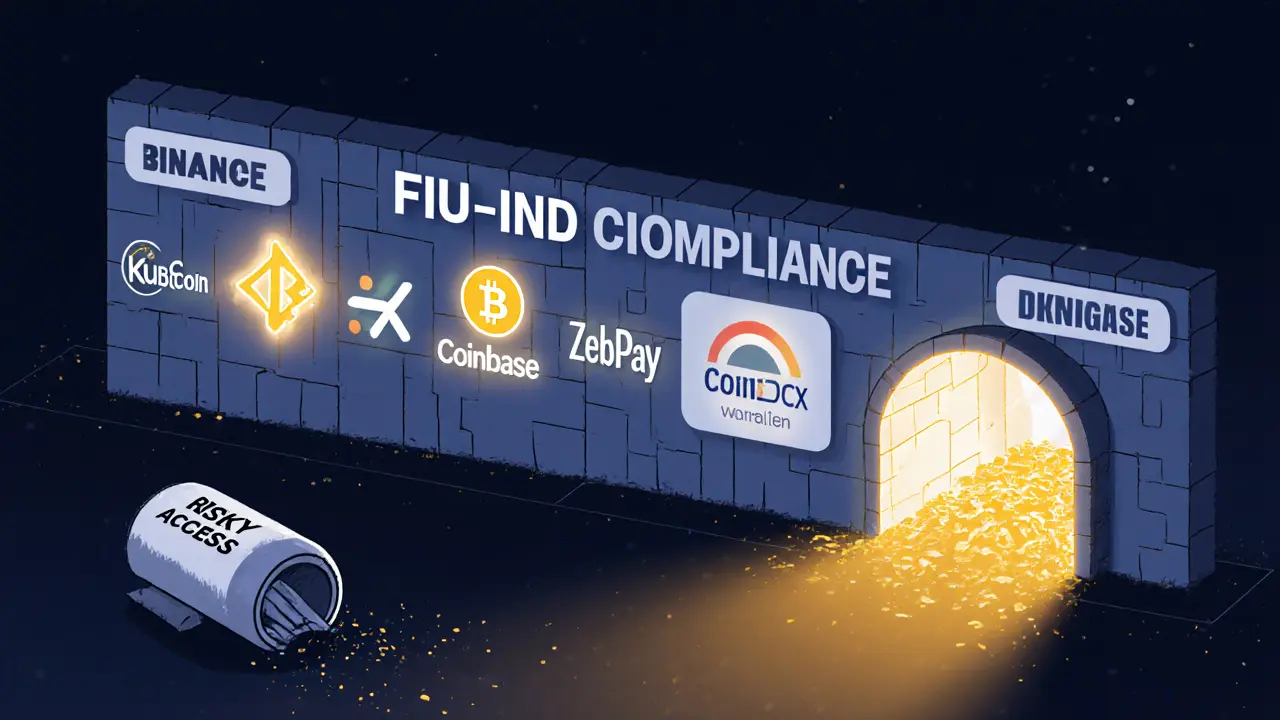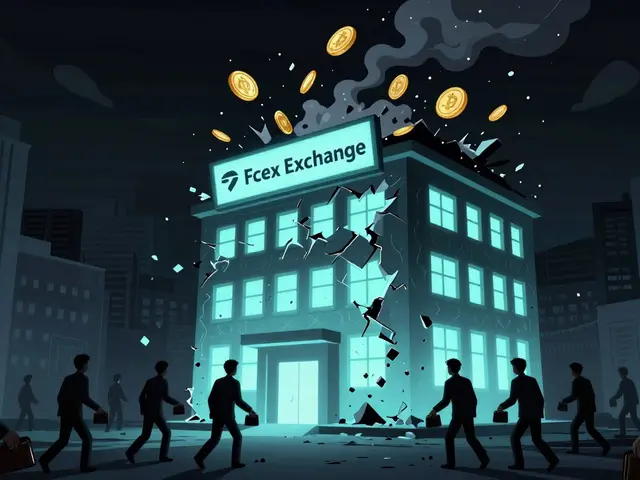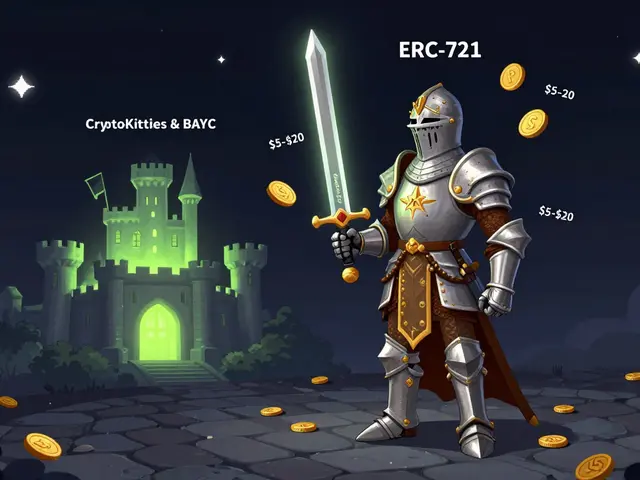Crypto Exchange Status Checker
Check Exchange Status in India
Enter an exchange name to verify if it's banned in India for non-registration with FIU-IND.
Enter an exchange name to check its status in India.
How We Determine Status
India bans exchanges that refuse to register with FIU-IND and comply with KYC, transaction reporting, and tax requirements. Only FIU-registered Indian exchanges like CoinDCX and WazirX are fully operational.
Banned Exchanges (as of 2025)
Compliant Exchanges
India hasn’t banned cryptocurrency-but it has shut the door on dozens of international crypto exchanges that refuse to play by its rules. If you’re trying to trade crypto in India and can’t access your favorite platform, it’s not a glitch. It’s enforcement. Since early 2023, the Financial Intelligence Unit-India (FIU-IND) has been cracking down hard on foreign exchanges that don’t register. The result? A clean slate for compliant platforms-and a long list of blocked ones.
Which crypto exchanges are banned in India?
As of 2025, the following international exchanges are blocked from serving Indian users because they never registered with FIU-IND:
- Binance - The world’s largest exchange was blocked in early 2023 after refusing to comply with Indian data and reporting rules. It later paid over $10 million in penalties but still hasn’t regained access.
- KuCoin - Completely inaccessible to Indian users since mid-2023. No registration, no access.
- Bybit - Faced multiple warnings, then a full website block. Paid fines but remains unregistered.
- OKX - Blocked in 2024 after failing to submit required transaction logs.
- Coinbase - Never launched officially in India, and despite rumors, has not registered with FIU-IND as of October 2025.
- Huobi - Shut down operations in India in 2022 and never reapplied.
These platforms still exist globally-but if you’re in India, you won’t be able to log in, deposit INR, or withdraw funds. The Indian government uses DNS blocking and banking restrictions to make them unusable. Even if you use a VPN, your bank will likely reject transfers to these exchanges.
Why were these exchanges banned?
It’s not about crypto being illegal. It’s about control. India requires every crypto exchange serving its citizens to register with FIU-IND and follow strict rules:
- Collect full KYC details (Aadhaar, PAN, address proof)
- Report all transactions to FIU-IND in real time
- Retain user data for at least six years
- Comply with anti-money laundering (AML) and counter-terrorist financing (CTF) protocols
Most foreign exchanges refused. They didn’t want to hand over user data to Indian authorities. They didn’t want to build local compliance teams. They thought they could operate anonymously. India didn’t blink.
The February 2025 Finance Bill added teeth to the rules. Under Section 285BAA, even if an exchange registers now, it must disclose all past transactions made by Indian users. That’s a dealbreaker for many. Why risk exposure to tax authorities and enforcement agencies for a market that already has local alternatives?

What about Indian crypto exchanges?
While foreign platforms got blocked, Indian exchanges exploded. They registered. They built systems. They adapted. Today, these are the only exchanges you can legally use in India:
- CoinDCX - Largest by volume. Over 2,000% deposit growth after the crackdown.
- WazirX - Owned by Binance, but operates independently under Indian law. Fully compliant.
- ZebPay - One of the oldest. Registered early and now handles billions in monthly trades.
- Unocoin - Focused on compliance and tax reporting. Offers auto-generated Form 16 for crypto gains.
- Mudrex - Gained 10,000+ users in weeks after Binance went dark.
- CoinSwitch Kuber - Aggressively marketed migration tools to users from banned platforms.
- BuyUcoin - Offered sign-up bonuses to lure users away from blocked services.
These platforms are now the backbone of India’s crypto market. They handle everything from spot trading to staking-and they file your tax reports for you. That’s the trade-off: less privacy, more protection.
What happens if you use a banned exchange?
Technically, you can still access them via VPN-but here’s what you risk:
- No legal recourse - If your account gets hacked or frozen, Indian authorities won’t help. You’re on your own.
- Bank account freezes - Banks like SBI, HDFC, and ICICI flag transfers to banned exchanges. Accounts get temporarily blocked for “suspicious activity.”
- Tax nightmares - You’re still liable for 31.2% tax on crypto gains. But without official trade summaries, you’re manually tracking every transaction. One mistake = 60% penalty under Section 158BA(7).
- Future exposure - If you ever register with a compliant exchange later, FIU-IND can cross-check your old transactions. Hidden trades become visible.
It’s not worth it. The convenience of a foreign exchange isn’t worth the risk of losing your bank access or getting hit with a massive tax penalty.

Why does India care so much?
India isn’t trying to kill crypto. It’s trying to control it. The government sees crypto as a potential tax base-not a threat. With over 15 million crypto users in India, unregulated trading means lost revenue. FIU-IND registration ensures:
- Every trade is recorded
- Every gain is taxed
- Every user is identifiable
Compare this to the U.S. or Europe-where exchanges report to tax agencies voluntarily. In India, it’s mandatory. And non-compliance has consequences.
The Reserve Bank of India’s 2018 crypto ban was overturned by the Supreme Court in 2020. But instead of going back to a free-for-all, India built its own system. One that puts the state in charge of oversight, not the market.
What’s next for crypto in India?
The door isn’t closed forever. If Binance or Coinbase registers tomorrow, they can return. But they’ll have to give up anonymity, hand over years of data, and accept permanent government scrutiny.
For now, the market has already moved on. Indian exchanges dominate 92% of trading volume. Foreign platforms are ghosts. Users have adapted. Tax compliance is now part of the routine.
India’s approach is harsh-but it’s clear. If you want to trade crypto here, you follow our rules. No exceptions. No loopholes. No VPNs that save you from the taxman.
Are crypto exchanges banned in India?
Not all of them. Only foreign exchanges that refuse to register with FIU-IND are banned. Domestic exchanges like CoinDCX, WazirX, and ZebPay are fully legal and operating. Cryptocurrency itself is not banned in India.
Is Binance banned in India?
Yes. Binance was blocked in 2023 for failing to register with FIU-IND. Despite paying over $10 million in penalties, it has not regained access as of October 2025. Indian users cannot deposit INR or withdraw funds from Binance.
Can I use Coinbase in India?
No. Coinbase has never officially launched in India and has not registered with FIU-IND. Accessing it from India will result in blocked transactions and potential bank account flags.
Are Indian crypto exchanges safe?
Yes, if they’re FIU-registered. Platforms like CoinDCX, WazirX, and ZebPay follow strict KYC and AML rules. They also provide tax reports and have customer support teams that respond under Indian law. Your funds are protected by local regulations.
What’s the tax rate on crypto in India?
Crypto gains are taxed at a flat 31.2% (including cess). There are no deductions or loss offsets. Only FIU-registered exchanges can generate official trade summaries for tax filing. Using unregistered platforms puts you at risk of penalties up to 60% for undeclared income.
Can I still trade crypto in India?
Yes. You can trade legally through any FIU-registered Indian exchange. CoinDCX, WazirX, ZebPay, and others offer full trading, staking, and withdrawal services. The market has fully shifted to these platforms since 2023.
Why did India ban crypto exchanges but not crypto?
India wants to tax crypto, not ban it. By forcing exchanges to register, the government gains visibility into transactions, ensures tax compliance, and prevents money laundering. Crypto trading is legal-but only if it goes through regulated channels.
What happens if I don’t report my crypto gains?
You risk a penalty of up to 60% of the unreported income under Section 158BA(7) of the Income Tax Act. The FIU can cross-check data from compliant exchanges with your tax return. Even if you used a banned exchange, your past trades can be traced if you later register with a compliant one.












People Comments
This is textbook authoritarian crypto control. India’s not banning crypto-they’re weaponizing tax enforcement to turn traders into compliant data subjects. Binance didn’t ‘refuse’-they saw the writing on the wall: surrender your users or get buried under compliance hell. And now? Indian exchanges are just state-sanctioned gatekeepers with KYC forms and tax receipts. Welcome to the surveillance economy, where your portfolio is a spreadsheet for the Revenue Department.
31.2% tax? That’s not regulation-that’s confiscation with a smile. And don’t even get me started on the ‘auto-generated Form 16’ nonsense. That’s not convenience, it’s digital indenture.
Meanwhile, the US and EU are still debating whether crypto is a commodity or a security. India already won. They turned speculation into a bureaucratic chore. Congrats, Modi. You’ve made trading crypto less fun than filing your TDS returns.
Interesting how the narrative shifts from ‘crypto is illegal’ to ‘crypto is legal but only if you play by our rules.’ It’s not about banning-it’s about capture. The government didn’t shut down the market; they absorbed it. And honestly? The domestic exchanges are doing a decent job. WazirX’s UI is clunky, but at least you know where your money is.
Still, the tax reporting burden is insane. 31.2% flat? No loss offsets? That’s punitive, not progressive. You’re basically taxed on paper gains even if you didn’t cash out. That’s not fiscal policy-that’s financial sadism.
Indian exchanges are working fine. No need for Binance. ZebPay and CoinDCX are reliable. Tax is high but transparent. Better than hiding money in offshore wallets.
VPN won’t save you. Banks block everything. Just use local platforms. Done.
So let me get this straight… India banned Binance because they didn’t want to hand over user data… but then they forced local exchanges to do exactly that? And now we’re supposed to be impressed that CoinDCX is ‘compliant’?
Wow. What a revolution. You traded one kind of surveillance for another. At least with Binance, you could pretend you were anonymous. Now you’re just a tax ID with a wallet.
Also, typo: ‘FIU-IND’ not ‘FIU-IND’ - wait, no, I’m just tired of typing it. My fingers hurt. And yes, I know I just typed it wrong again. I’m not a robot. I’m a human who just wants to buy Dogecoin without filling out a 12-page form.
wait so if i used binance before 2023 and never reported it… and now i sign up for coinDCX… they can see all my past trades??
that’s wild. like… they’re basically saying ‘hey we know what you did last summer’
so… is this like crypto amnesty or just a trap??
Anyone else notice how the Indian exchanges all have the same marketing strategy? ‘We’re safe! We file your taxes! We’re legit!’ It’s like they’re trying to convince themselves more than us.
Also, WazirX being owned by Binance but ‘operating independently’ is the most ironic thing I’ve read this week. That’s like saying ‘I’m not a vampire, I just drink blood on Tuesdays.’
It’s fascinating how this mirrors broader global trends-states realizing they can’t stop decentralized tech, so they instead try to domesticate it. India’s approach is brutal, but it’s not irrational. If you can’t eliminate a market, you regulate it into submission.
But the real question: is this sustainable? What happens when a new generation grows up thinking crypto is only legal if it’s taxed at 31.2%? Will they still believe in decentralization-or will they accept state-controlled digital assets as the new normal?
And if so… what does that mean for the entire philosophy of blockchain?
VPN won't help. Banks block. Tax is 31.2%. You're screwed. Just use CoinDCX.
Done.
Hi everyone! 💡 Just wanted to share a quick tip! 📌 If you're using Indian exchanges like CoinDCX or ZebPay, ALWAYS double-check your trade summaries before filing taxes! 📊 The auto-generated reports are super helpful, but sometimes they miss small swaps or staking rewards! 💸
Also, if you're new to crypto in India, don't panic about the 31.2% tax-it's actually lower than capital gains in some countries! 🇺🇸📈 And hey, at least you're not risking your bank account like some folks who still use banned exchanges! 🚫💸
Love you all! Stay safe and tax-compliant! ❤️🙏
Oh wow. So India just turned crypto into a government-run utility. Brilliant. Because nothing says freedom like being forced to submit your wallet history to a bureaucracy that still uses fax machines.
Meanwhile, in the U.S., we’re still arguing whether a dog coin is a security or a meme. Pathetic.
And now people are praising Indian exchanges like they’re heroes? ‘Oh look, WazirX filed my taxes!’ No. You’re just a taxpayer now. With a wallet. And a digital leash.
Next thing you know, they’ll require you to smile while submitting your Form 16. And if you don’t? Your crypto gets revoked. Like a library card.
This isn’t innovation. It’s digital feudalism with a mobile app.
Everyone’s acting like this is some big deal but honestly it’s just capitalism with extra steps. Of course Binance didn’t register-they’re a global company. Why would they bend to one country’s rules? And now Indian users are stuck with local exchanges that charge higher fees and have worse UI? Classic.
And 31.2% tax? That’s not regulation. That’s theft. You’re not even allowed to offset losses. So if you lose 10k and gain 10k? You still pay tax on the gain. That’s not a tax code. That’s a punishment system.
And don’t get me started on the ‘compliance’ theater. If you really wanted to stop money laundering, you’d monitor the banks, not the traders.
Honestly? I think India’s doing something bold here. Most countries are still fumbling with crypto regulation. India just said: ‘Here’s the rules. Follow them or get out.’ And guess what? People adapted.
Yeah, it’s strict. Yeah, it’s invasive. But the market didn’t die-it grew. More users. More liquidity. More tax revenue. And real customer support you can actually call.
It’s not perfect. But it’s working. And that’s more than I can say for most places.
Indian exchanges are the real MVPs 🙌
WazirX saved my portfolio after Binance went dark 💪
Tax is high but at least I know I’m legal 😎
Stay safe out there! 🚀
Let’s be clear: this isn’t just about tax compliance-it’s about sovereignty. India recognized that unregulated financial systems, even those built on decentralized technology, pose systemic risks to monetary policy, consumer protection, and national security. The FIU-IND registration framework isn’t draconian; it’s a necessary evolution of financial governance in the digital age.
Comparing this to the U.S. or EU is misleading. Those jurisdictions are still operating under outdated, fragmented regulatory paradigms. India didn’t wait for consensus. It acted decisively.
Yes, the 31.2% tax is high. But it’s transparent. It’s predictable. And it’s collected from a market that, until recently, operated in a legal gray zone with zero reporting obligations. That’s not punishment-it’s accountability.
And to those who argue about privacy: if you’re transacting in a sovereign nation’s currency and using its banking infrastructure, you forfeit the expectation of total anonymity. That’s not surveillance. That’s citizenship.
Let’s stop romanticizing offshore opacity. This is the future of global finance: regulated, traceable, and accountable.